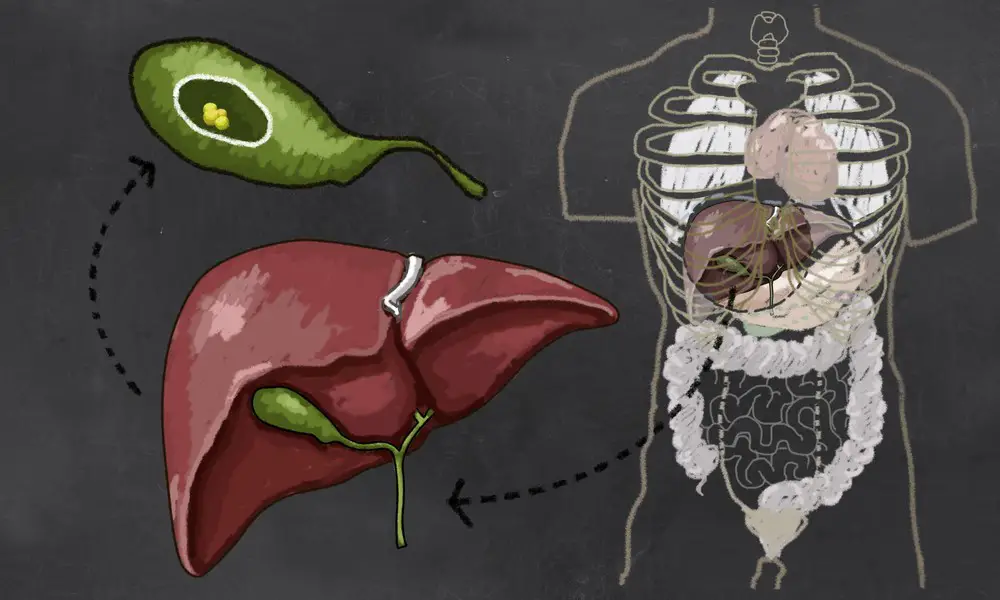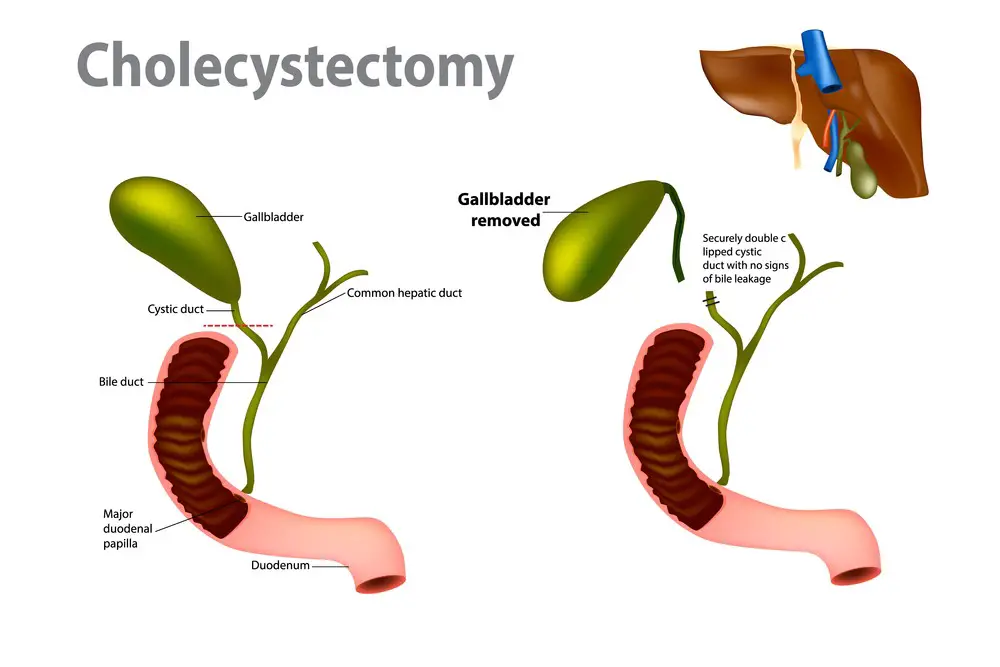Recovering from gallbladder surgery can be challenging, especially when finding a comfortable sleeping position. It’s essential to prioritize rest and ensure a good night’s sleep to promote healing and overall well-being. This article will provide valuable insights on how to sleep after gallbladder surgery while minimizing pain and discomfort.
One of the critical factors of post-gallbladder surgery is understanding the changes your body has undergone and what to expect during the recovery process. This includes developing a supportive sleep environment, being mindful of dietary restrictions, and learning to manage pain effectively. Taking care of yourself and maintaining open communication with your healthcare team can significantly improve your sleep quality as you recover.
Key Takeaways
- Optimal sleep positions and comfort are crucial for post-gallbladder surgery recovery
- Maintaining a sleep-conducive environment and managing pain effectively aid in restful sleep
- Proper diet, wound care, and communication with healthcare providers play essential roles in recovery

Understanding Gallbladder Surgery
Gallbladder surgery, commonly known as cholecystectomy, removes the gallbladder, a small organ that stores bile produced by the liver. It plays a crucial role in digestion, particularly in breaking down fats. However, gallbladder issues like gallstones, cholecystitis (inflammation), and pancreatitis can necessitate surgical intervention.
There are two primary types of gallbladder surgery: laparoscopic and open. Laparoscopic surgery is the more prevalent method and is regarded as minimally invasive. In this procedure, the surgeon makes several small incisions in the abdomen, inserts a laparoscope with a camera, and carefully removes the gallbladder. Patients typically recover quicker with laparoscopic surgery and experience less scarring and pain.
On the other hand, open cholecystectomy involves a single, larger incision in the abdomen. The surgeon then removes the gallbladder through this incision. This procedure is often reserved for cases with complications or when laparoscopic surgery may not be feasible. Recovery time is generally longer, and the risk of complications may be higher.
Regardless of the method, it’s crucial to understand that gallbladder surgery, like any surgery, carries certain risks. Complications can include infection, bile leakage, and injury to the bile duct or other nearby structures. Nevertheless, most patients achieve successful outcomes and can return to regular activities shortly after the procedure.
Proper post-surgery care is vital to ensure a smooth recovery. Rest, adhering to your doctor’s instructions, and understanding how to manage your sleep can make all the difference. So, as you embark on this journey to better health, remember to stay confident in your decision and informed. Your body will thank you for it!

Postoperative Recovery and Complications
Ah, the much-awaited relief after gallbladder surgery! Nevertheless, following certain guidelines and being aware of potential complications during the recovery process is crucial. With great care and persistence, one can experience a smooth healing journey.
During the initial phase, pain at the incision sites seems inevitable. Feeling discomfort is perfectly normal but gradually subsides as the healing progresses. Pain medication prescribed by the physician comes in handy in managing this discomfort. Swelling and inflammation around the incisions might also be observed, but ice packs can help with the swelling.
Now, let’s address the elephant in the room: bloating and gas. Accumulated gas after surgery might create discomfort and, sometimes, add pressure on the diaphragm, which causes mild pain. In such cases, regular short, gentle walks can work wonders for relieving this bloating sensation.
Moreover, anesthesia doesn’t leave without a trace. Initially, it might cause nausea, vomiting, diarrhea, or dizziness. Fear not; these symptoms are short-lived and should disappear on their own. However, if these symptoms worsen or persist, promptly consult a healthcare professional.
Oh, dear! Infections can also sneak in during the recovery time. Signs of infection include fever, prolonged swelling, and discharge from the incision sites. If one suspects an infection, seeking medical attention is crucial. Additionally, jaundice, characterized by yellowing of the skin and eyes, may indicate postoperative complications – don’t hesitate to reach out to your doctor in such circumstances.
In conclusion, the recovery phase after gallbladder surgery demands attention and care. Each individual’s healing process varies and may include occasional hiccups. Just remember to stay vigilant and attentive to your body’s cues. You’ll sail through this recovery journey with patience and determination and emerge healthy and strong.
Sleeping Position and Comfort
After gallbladder surgery, finding a comfortable sleep position can be tricky. But don’t worry; we’ve got your back! In this section, we’ll suggest some helpful ideas for sleeping positions to alleviate pain and cramps, ensuring a good night’s rest.
First, it’s essential to avoid lying flat on your back. This position may cause pressure on your incision and increase abdominal pain. Instead, try elevating your upper body using a few pillows to alleviate discomfort and promote healing. Some people find it helpful to create a makeshift recliner using pillows to support their back and shoulders. It’s all about finding what works best for you, so feel free to experiment until you discover your ideal setup.
Sleeping on your right side can be a smart choice after gallbladder surgery. This position is generally more comfortable than sleeping on the left side, as it helps keep pressure off your incision area. You might want to place a pillow between your knees for extra support and alignment. Everyone, ‘s different, so it’s essential to listen to your body and adjust accordingly.
When it comes to comfort, pillows are your greatest ally. In addition to supporting your upper body and knees, you can also use them to create a cozy nest around you. Placing a pillow under your abdomen or arms can help to relieve pressure and ease pain or cramps. Don’t be afraid to surround yourself with cushions – the goal is to find a position that keeps you feeling snug and secure all night.
Remember that your mattress plays a crucial role in your overall comfort. If you’re struggling to get comfy despite trying various positions and pillow arrangements, it could be that your mattress needs an upgrade. Opt for a mattress that provides firm but gentle support to keep you pain-free throughout the night.
In conclusion, finding the perfect sleeping position after gallbladder surgery may take some time and patience. Experiment with different arrangements of pillows and consider your mattress quality to create a comfortable, pain-free environment for a restful night’s sleep. Trust your instincts, and remember that it is crucial to prioritize comfort to promote healing. Sweet dreams!
Creating a Sleep-Conducive Environment
Ah, there’s nothing like a peaceful, comfortable environment to drift off into dreamland after gallbladder surgery. Let’s dive into some top-notch tips to create the perfect sanctuary for catching those much-needed Zzz’s.
First things first, controlling the light in your sleep space is essential. Think about investing in blackout curtains, which will help block out pesky sunlight or streetlights that might disturb your slumber. Alternatively, donning an eye mask can work wonders too! This simple solution keeps light at bay and may even gently pressure your eyes, promoting relaxation.
Now, you might be wondering, “What about noise?” No problem – enter noise-canceling earplugs! These tiny lifesavers can make a monumental difference in blocking out disturbances, creating tranquility perfect for resting. Trust us; they’re a game-changer.
Another tip to consider is incorporating aromatherapy into your bedtime routine. Inhaling delightful scents like eucalyptus oil can have soothing effects and help calm your senses. Of course, feel free to explore other fragrances that soothe your soul – it’s all about personal preference!
Lastly, let’s not overlook the importance of controlling your room’s temperature. Experts say a cool environment, between 60-67°F (15-19°C), is optimal for sleeping. So, go ahead and adjust that thermostat to your liking – your body will thank you.
By taking these steps, you’ll transform your room into a haven of serenity, perfect for recovering after gallbladder surgery. Remember, a great night’s sleep is just a few adjustments away. Happy snoozing!
Diet and Digestion After Surgery
Following gallbladder surgery, getting the digestive system back on track is vital. Not only because discomfort might be experienced but also to ensure a smooth recovery process. The liver, which once depended heavily on the gallbladder to store bile and handle fats, now has to rely on the small intestine. Here’re some tips on what to eat and how to manage digestion after gallbladder surgery:
After surgery, the body might be sensitive to fatty foods, so it’s best to gradually reintroduce fats into the diet. For starters, favor lean sources of protein over fatty meats and stick to unsaturated fats – think avocados, nuts, and olive oil. It’s also wise to avoid larger, heavy meals during this period. Instead, opt for smaller, more frequent meals, which are gentler on the stomach and promote better digestion.
Now, let’s dive into the importance of a well-balanced, fiber-rich diet. Including whole grains, fruits, and vegetables in the daily diet is essential, as these nourishing foods help regulate bowel movements and keep the digestive system in check. Who doesn’t love a happy and healthy stomach, right?
However, some foods might be troublesome for individuals recently undergoing gallbladder surgery. High-fat and fried foods and heavily spiced meals can cause an upset stomach and should be limited in consumption. These dishes might be mouthwatering, but they’re not friends of the stomach, at least for a while.
Hydration is key in any recovery process, and gallbladder surgery is no exception. Drinking plenty of water and other hydrating liquids aids in digestion and helps flush out the system. Plus, water makes everything run smoothly, just like a well-oiled machine!
Lastly, chatting with a healthcare professional or nutritionist about the best-personalized diet plan to follow after gallbladder surgery is important. After all, everyone’s body is unique, and expert guidance can help strike the perfect balance in one’s diet.
To sum it up, taking care of one’s diet and digestive health after gallbladder surgery certainly plays a significant role in the overall recovery. Paying close attention to food choices and remembering to stay hydrated will help ensure a smooth and comfortable transition to life without a gallbladder. Happy healing!
Pain Management and Medication
After gallbladder surgery, finding ways to manage pain effectively is crucial. Don’t worry! There are several options when it comes to alleviating discomfort. In many cases, doctors will prescribe medications to help you get through the recovery process with ease.
Many patients find relief through painkillers. Over-the-counter options such as ibuprofen and naproxen can be quite effective. These medications alleviate pain, help reduce inflammation, and promote healing. Always follow the recommended dosage and consult your doctor if you’re unsure about anything.
If over-the-counter pain medications aren’t sufficient, your doctor may suggest stronger prescription painkillers. As with any medication, take these only as directed to avoid potential side effects and complications. Remember that some medications can be habit-formulating, so using them responsibly and only when necessary is crucial.
While medications can provide relief, they are not always the only answer. You can also try alternative pain-reducing techniques, such as taking deep breaths, applying heat packs, or using relaxation and meditation techniques. Discovering the right method for pain management may take some experimentation, but it’s worth investing the time and effort to ensure a more comfortable recovery.
In conclusion, managing pain after gallbladder surgery involves a carefully coordinated plan involving medications, including painkillers like ibuprofen and naproxen, and alternative techniques. Always consult your doctor before trying new medications or methods of pain relief. Soon, you’ll be on your way to a more comfortable and successful recovery.
Establishing Good Sleep Habits
Getting a good night’s sleep after gallbladder surgery can be challenging but essential for proper healing and overall well-being. Good sleep habits play a crucial role in ensuring you get the rest your body needs. So, let’s dive in and explore some effective strategies to create a sleep-supportive environment!
First off, exercise is a fantastic way to help your body adjust to its new rhythm after surgery. While strenuous activities aren’t recommended post-operation immediately, gentle walking is an excellent, low-impact option. Aim for short, frequent strolls throughout the day. This will help with digestion and tire your body out enough to encourage a restful night.
Another essential practice to consider is incorporating relaxation techniques before bedtime. These techniques range from deep breathing exercises to progressive muscle relaxation, helping the body relax and prepare for sleep. Moreover, meditation can be beneficial in slowing down racing thoughts, fostering a sense of calm, and promoting better sleep quality.
Now, what if sleep still eludes you? Don’t fret! This is quite common after surgery, and there’s a term for it – insomnia. The good news is that there are ways to tackle it. Establishing a regular sleep schedule, keeping your sleeping environment cool and dark, and avoiding caffeine or heavy meals in the evening can greatly improve sleep quality.
Finally, remember that patience is key. Your body is recovering from surgery, so it’s normal to experience sleep disturbances. By trying these strategies and giving yourself time to adjust, you’ll soon be on the path to a peaceful and rejuvenating slumber. Sweet dreams!

Self-Care and Wound Care
After gallbladder surgery, it’s essential to prioritize self-care and wound care. It can be tricky, but don’t fret; we’ve got you covered! Caring for your wounds properly will make a difference in the healing process.
For starters, let’s discuss your incision site. It’s normal to see some swelling and redness. But watch for signs of infection, such as increased pain, pus, or fever. Don’t hesitate to contact your doctor if you notice any of these.
Now, let’s talk about bandages. Gently replace them as needed, but never be too rough. You’ll likely have dissolvable stitches, which makes the process a breeze, or you may have steri-strips to keep the edges of your wound together. These will peel off after a week or so, and you don’t need to worry about removing them yourself.
When it comes to showering, you’re in luck! You can shower 24 hours after surgery, but avoid getting the incision site too wet. And please, resist the urge to soak in a bath or swim for a while—this can slow the healing process and increase the risk of infection.
It’s crucial to balance being gentle with your body and resuming your daily activities. Light exercise, such as walking, can help reduce the risk of blood clots and promote healing. However, remember not to overdo it—listen to your body and rest when needed. Avoid heavy lifting and other strenuous activities for at least four to six weeks.
Lastly, be mindful of what you consume. Aim for a low-fat diet as it will ease digestion and make the transition back to regular eating smoother. Foods like lean meats, fish, whole grains, and fresh fruits and veggies are your friends. Oh, and stay hydrated!
By following these self-care and wound-care guidelines, you’ll be on the road to a smooth recovery and a good night’s sleep after gallbladder surgery. Remember to be patient with yourself, and don’t hesitate to contact your healthcare team if you have any concerns.
Communication and Support
After removing your gallbladder, it’s essential to have open communication and support from those around you, whether it’s with your healthcare provider, friends, or family. Maintaining this dialogue will help ease any concerns and guide you through recovery.
Discussing your surgery with a healthcare provider before the procedure can shed light on what to expect during the recovery period, including potential issues with sleep. They can also give advice on pain management and any necessary adjustments to your daily routine.
At work, it’s important to inform your employer about your upcoming absence due to surgery. This allows for appropriate accommodations and understanding from your colleagues. Flexibility may be necessary if you experience post-surgery fatigue, which is relatively common.
Moreover, seeking guidance from online forums or support groups can be helpful and provide comfort, as you’ll connect with others who have undergone similar experiences. Sharing your thoughts and exchanging advice can create a sense of camaraderie, easing the feelings of isolation that might occur during the healing process.
Remember, building a support network is crucial to keep you in high spirits and ensure a smooth recovery process. Communicate your needs and concerns openly so that you’re armed with the necessary tools to tackle the challenges that may surface during this time. But most importantly, don’t hesitate to lean on one another for comfort and reassurance—you’re not in this alone!
Sleep Disruptions and Management Strategies
After gallbladder surgery, it’s no surprise that patients often face difficulty sleeping. The lingering effects of general anesthesia and pain, nausea, and vomiting can create a significant barrier to restful slumber. But don’t fret – by adopting clever strategies; sleep can become much more accessible following the surgery.
For starters, proper pain management is crucial. Patients must work closely with their healthcare team to devise an appropriate medication plan. Remember, resting is key in recovery, and uncontrolled pain makes it challenging to sleep soundly. The best practices for taking pain relief medications, particularly at bedtime, are worth discussing with the doctor.
Meanwhile, sleeping positions deserve some attention too. Keeping the head elevated may be helpful, as this can alleviate pressure on the surgical area. Some folks find relief by sleeping on their backs or their non-surgical side. Experimenting with different positions and cushions can make all the difference – patience goes a long way!
Moreover, limiting screen time before bed can be beneficial for everyone, but it’s particularly important after gallbladder surgery. The blue light emitted from screens has a knack for disrupting sleep patterns. It’s best to avoid electronic devices for at least 1-2 hours before bedtime – try reading a book or listening to relaxing music instead.
Additionally, nausea and vomiting may disrupt sleep attempts, so addressing these concerns is important. Eating smaller, more frequent meals, avoiding spicy or fatty foods, and discussing anti-nausea medications with the healthcare team can mitigate these obstacles to a peaceful night’s rest.
Lastly, but just as critical, is avoiding strenuous activity and heavy lifting. Overexertion could not only be painful but can also compromise the healing process. Focus on rest for the time being – there’ll be plenty of time for physical activity once you’ve recovered.
In conclusion, by combining thoughtful pain management, optimal sleeping positions, reduced screen time, and proper care for nausea, a good night’s sleep becomes well within reach for those recovering from gallbladder surgery. Trust in these strategies, and soon enough, you’ll be back to enjoying a restful slumber.
Returning to Normal Activities
After gallbladder surgery, it’s natural to wonder when you can return to your usual activities. Thankfully, you’ll be back in action with patience and some gradual steps before too long.
In the initial recovery period, it’s essential to take it easy. Focus on getting out of bed and moving around, starting with short walks around your home. This will help prevent blood clots and aid digestion. Don’t worry; moderate activity won’t damage the surgical site.
Once you feel better, you can gradually increase your movement and exercise. Be sure to listen to your body and avoid pushing yourself too hard. If you experience pain or discomfort, it’s a signal to take a step back and perhaps take a short break.
During this time, it’s critical to adhere to the advice of your healthcare provider. They’ll guide you on when to resume specific activities, such as driving, lifting heavy objects, and engaging in sports or exercise programs. Everyone’s recovery journey is different, so be kind to yourself and allow for some flexibility.
Remember that the recovery process is just as important as the surgery itself. With the right mindset and following your doctor’s advice, you’ll return to normal activities quickly. Just be patient and stay confident that you are on the right track.
Frequently Asked Questions
What is the best sleeping position after gallbladder surgery?
After gallbladder surgery, the most comfortable and recommended position for sleep is typically on your back. Elevating your head and shoulders with extra pillows can help minimize pain and discomfort. Some may find relief by sleeping on their non-operated side, using a pillow for support. Remember, listening to your body and adjusting your position according to what feels best for you is essential.
How long should you wait before going to sleep post-operation?
Most surgeons recommend waiting at least a few hours after surgery before attempting to sleep. It’s important to allow your body time to awaken from anesthesia and adjust to the immediate postoperative period. However, some patients may feel drowsy and ready for sleep soon after surgery. In that case, it’s advised to follow your body’s cues and rest when you can.
Are any precautions needed to ensure a good night’s sleep?
Indeed, you can take a few precautions to ensure a restful night after gallbladder surgery. Make certain the room remains cool and dark to help facilitate sleep. A relaxing bedtime routine, like reading or listening to calming music, can also help signal your body that it’s time to rest. Keep any necessary pain medications within reach, and consider setting the alarm to take them as required to avoid waking up in pain.
How can pain management aid in sleeping after surgery?
Effective pain management is crucial for a good night’s sleep following gallbladder surgery. Always take your prescribed pain medications as directed, and don’t hesitate to contact your healthcare team if you experience unmanageable pain. A well-rested patient typically responds better to the healing process, so don’t underestimate the importance of pain control.
What to expect regarding disrupted sleep patterns after gallbladder surgery?
It’s not uncommon for patients to experience disrupted sleep patterns following surgery, including gallbladder removal. Factors such as anesthesia, pain, and discomfort might affect your ability to fall or stay asleep. Be patient with yourself, and remember that these changes are usually temporary. Your sleep patterns should eventually return to normal as your body continues to heal.
Do certain aids or accessories help improve sleep quality post-operation?
Yes, there are a variety of aids and accessories that can help improve sleep quality after gallbladder surgery. As mentioned, extra pillows can support the head, shoulders, or abdomen, reducing discomfort. A comfortable and supportive mattress is also crucial, as it can help minimize pressure on the surgical area. Some patients may benefit from sleep aids or relaxation techniques like deep breathing or meditation. As always, consult your healthcare team before trying new sleep aids or techniques post-surgery.
- Stress Relieving Benefits of Spending Time in a Garden: Interesting Facts to Know - February 16, 2024
- How to Reduce Anxiety Immediately: Quick and Effective Techniques - February 15, 2024
- Can Stress Cause Bloating? Understanding The Link Between Stress And Digestive Issues - February 15, 2024
This site contains affiliate links to products. We will receive a commission for purchases made through these links.




